Best Warehouse Management Software
Best warehouse management software includes Infor WMS, Zoho, LOGIC ERP, Oracle, Brightpearl, and Fishbowl. Such warehouse management systems (WMS) provide real-time information about inventory, tracking products, managing orders, and other related operations.



No Cost Personal Advisor
List of 20 Best Warehouse Management Software
Category Champions | 2024
Warehouse management software for growing business
This cloud-based WMS software provides affordable and quick solutions for managing warehouse business along with getting insights to improve services. Manage stocks among multiple warehouses and deliver services from the nearest using Zoho Inventory. Read Zoho Inventory Reviews
Explore various Zoho Inventory features, compare the pricing plans, and unlock the potential of seamless operations by selecting the right software for your business.
Features
View all Zoho Inventory Features- Barcode Scanning
- Channel Management
- Serialized Inventory Tracking
- Order Fulfillment
- Barcoding / RFID
- Invoicing
- Traceability
- Supplier and Purchase Order Management
Pricing
Zoho Inventory Caters to
- StartUps
- SMBs
- Agencies
- Enterprises
#1 Cloud ERP for Fast-Growing Businesses
NetSuite, #1 cloud ERP, is an all-in-one cloud business management solution that helps more than 29,000 organizations operate more effectively by automating core processes and providing real-time visibility into operational and financial performance. Read Oracle NetSuite ERP Reviews
Explore various Oracle NetSuite ERP features, compare the pricing plans, and unlock the potential of seamless operations by selecting the right software for your business.
- CRM
- Multicurrency payment processing
- Integration capabilities
- Time & Attendance Management
- Payment Gateway Integration
- Opportunity Management
- Recurring invoice
- Project Management
Oracle NetSuite ERP Caters to
- StartUps
- SMBs
- Agencies
- Enterprises
Emergents | 2024
Complete suite for Warehouse Management
A complete solution that enhances supply chain warehouse operations is Oracle Fusion Cloud SCM. It has functions including order fulfillment, receiving, shipping management, and inventory tracking. Businesses can increase customer satisfaction, streamline procedures, and boost efficiency with its real-time visibility into warehouse activities. Learn more about Oracle Fusion Cloud SCM
Explore various Oracle Fusion Cloud SCM features, compare the pricing plans, and unlock the potential of seamless operations by selecting the right software for your business.
- Maintenance Management
- Materials Management
- Inventory Management
- Warehouse Management
- Demand Planning
- Enterprise Asset Management
- Supply Chain Collaboration
- Order Fulfillment
Oracle Fusion Cloud SCM Caters to
- StartUps
- SMBs
- Agencies
- Enterprises
Category Champions | 2024
Cloud WMS for Fast-Growing Businesses
With integrated mobile operation features, this warehouse management software helps to streamline warehouse business saving time and cost, and increases accuracy through error-free functioning. Manage operations using NetSuite ERP to keep in check your inventory. Read Oracle NetSuite ERP Reviews
Explore various Oracle NetSuite ERP features, compare the pricing plans, and unlock the potential of seamless operations by selecting the right software for your business.
- Client Management
- MES
- Payment Management
- Workflow Management
- Payment Tracking
- Segmentation
- Donation Tracking
- Social Sharing
Oracle NetSuite ERP Caters to
- StartUps
- SMBs
- Agencies
- Enterprises
Emergents | 2024
Achieve perfect warehouse management
When speed and accuracy are critical to customer satisfaction, businesses rely on their warehouses to keep the supply chain moving. Infor WMS combines warehouse fulfillment with embedded labor management and 3D visual analysis to give unprecedented visibility into inventory, orders, equipment, and people. Learn more about Infor WMS
Explore various Infor WMS features, compare the pricing plans, and unlock the potential of seamless operations by selecting the right software for your business.
Features
View all Infor WMS Features- Warehouse Management
- Job Assignment Management
- Job Management
- Barcode Scanning
- Parts Management
- Retail Inventory Management
- Warehouse Inventory Management
- Order Management
Infor WMS Caters to
- StartUps
- SMBs
- Agencies
- Enterprises
Emergents | 2024
Trusted Solution for Warehouse Management
Maintain a smooth flow of warehouse operations with the help of Wasp inventory solution that helps to manage everything from pickup to shipping. This warehouse management tool enables automatic auditing of deliverables to speed-up operations. Learn more about Wasp Inventory Management
Explore various Wasp Inventory Management features, compare the pricing plans, and unlock the potential of seamless operations by selecting the right software for your business.
- Supplier Management
- Quality Control
- Audit Trail
- Reorder Management
- Kitting
- Inventory Management
- Forecasting
- Inventory Optimization
Pricing
Standard
$ 795
One Time
Professional
$ 2695
One Time
Enterprise
$ 4495
One Time
Wasp Inventory Management Caters to
- StartUps
- SMBs
- Agencies
- Enterprises
Emergents | 2024
Easy-to-use Top Rated Warehouse Management Solution
Brightpearl is a warehouse management solution software tailor-made for wholesalers and retailers to integrate warehouse business with the entire business solution. This WMS tool ensures order fulfillment along with increased revenue through analysis. Learn more about BrightPearl
Explore various BrightPearl features, compare the pricing plans, and unlock the potential of seamless operations by selecting the right software for your business.
Features
View all BrightPearl Features- Barcoding / RFID
- Recurring Orders
- Shipping Management
- Order entry (OE)
- Inventory Tracking
- Inventory Management
- Back Order Management
- Inventory control
Pricing
Basic
$ 375
Per Month
BrightPearl Caters to
- StartUps
- SMBs
- Agencies
- Enterprises
Emergents | 2024
Trusted Software for Warehouse Management
Manage warehouse management and distributed networks using Aptean Catalyst WMS which is a scalable and robust WMS software. With user-friendly features, this warehouse management program allows managing resources dynamically based on real-time tracking. Read Aptean ERP Reviews
Explore various Aptean ERP features, compare the pricing plans, and unlock the potential of seamless operations by selecting the right software for your business.
Features
View all Aptean ERP Features- Sales and Distribution
- Applicant tracking
- Financial Management
- Returns Management
- Warehouse Management
- Barcoding / RFID
- Business intelligence (BI)
- Category Customization
Aptean ERP Caters to
- StartUps
- SMBs
- Agencies
- Enterprises
Emergents | 2024
Fully Featured Warehouse Management Tool
This warehouse management software makes the task of small and mid-size businesses easy by providing affordable inventory management solutions. Fishbowl allows keeping track of orders throughout the order lifecycle from pickup to delivery. Learn more about Fishbowl Inventory Management
Explore various Fishbowl Inventory Management features, compare the pricing plans, and unlock the potential of seamless operations by selecting the right software for your business.
- Customer Purchase History
- Warehouse Inventory Management
- Traceability
- Returns Management
- Supplier Management
- Pricing Management
- Inventory Optimization
- Order entry (OE)
Pricing
Starter
$ 4395
One Time
Fishbowl Inventory Management Caters to
- StartUps
- SMBs
- Agencies
- Enterprises
Emergents | 2024
Easy to use Warehouse Software
Unleashed is a warehouse software that is helpful to maintain warehouse requirements of distributors, wholesalers, and manufacturers by providing real-time tracking of stock management. Mobile app of this WMS software keeps you updated with sales. Learn more about Unleashed
Explore various Unleashed features, compare the pricing plans, and unlock the potential of seamless operations by selecting the right software for your business.
Features
View all Unleashed Features- Inventory Optimization
- Reorder Management
- Kitting
- Shipping Management
- Warehouse Management
- Returns Management
- Order Processing
- Supplier Management
Pricing
Small
$ 85
Per Month
Medium
$ 165
Per Month
Large
$ 329
Per Month
Unleashed Caters to
- StartUps
- SMBs
- Agencies
- Enterprises
Emergents | 2024
Top Tool for Warehouse Management
Maintain workflow of an entire supply chain using this warehouse software to manage warehouse task thereby optimizing work at low costs. EnterpriseIQ helps to keep your stocks in check along with managing shipments, orders, delivery and refunds. Read EnterpriseIQ Reviews
Explore various EnterpriseIQ features, compare the pricing plans, and unlock the potential of seamless operations by selecting the right software for your business.
Features
View all EnterpriseIQ Features- Warehouse Management
- Warehouse Inventory Management
- CRM
- Invoicing
- Manufacturing
- Quotation & Estimates
- Project Management
- Applicant tracking
EnterpriseIQ Caters to
- StartUps
- SMBs
- Agencies
- Enterprises
Category Champions | 2024
Warehouse Software for Businesses
Integrate this WMS software with your existing system to efficiently manage the warehouse with a centralized inventory tracking system that ensures you never go out of stock. Orderhive also has location-based sales data to improve delivery services. Read Orderhive Reviews
Explore various Orderhive features, compare the pricing plans, and unlock the potential of seamless operations by selecting the right software for your business.
Features
View all Orderhive Features- Order Fulfillment
- Invoicing
- Real Time Reporting
- Location Control
- 3PL Management
- Forecasting
- Warehouse Management
- Reorder Management
Pricing
Starter
$ 50
Per Month
Professional
$ 150
Per Month
Growth
$ 300
Per Month
Orderhive Caters to
- StartUps
- SMBs
- Agencies
- Enterprises
Emergents | 2024
Clous-based WMS Software
With efficient cloud solutions, this warehouse management software eases the task of shipping, tracking stocks, managing suppliers and supports multiple languages for speed performance. Automate your business using Megaventory to deliver effectively. Learn more about Megaventory Inventory
Explore various Megaventory Inventory features, compare the pricing plans, and unlock the potential of seamless operations by selecting the right software for your business.
- Workflow Management
- Billing System
- Barcode Scanning
- Invoicing
- Inventory Optimization
- Supplier Management
- Inventory control
- Receiving / Putaway Management
Pricing
Starter
$ 10
Per Month
Business
$ 50
Per Month
Corporate
$ 100
Per Month
Megaventory Inventory Caters to
- StartUps
- SMBs
- Agencies
- Enterprises
Contenders | 2024
Smart Warehouse Management Software
PALMS™ Smart WMS offers configurable warehouse management software solutions improving performance of warehouse operations. Improved Utilization & Tracking of Man Hours through live monitoring dashboards. Read PALMS™ Smart WMS Reviews
Explore various PALMS™ Smart WMS features, compare the pricing plans, and unlock the potential of seamless operations by selecting the right software for your business.
Features
View all PALMS™ Smart WMS Features- Business intelligence (BI)
- Supplier and Purchase Order Management
- Custom Pricing Options
- Procurement Management
- Warehouse Inventory Management
- Order Management
- Barcode Scanning
- Cross Docking
PALMS™ Smart WMS Caters to
- StartUps
- SMBs
- Agencies
- Enterprises
Category Champions | 2024
Speed up the process with WMS for 100% accuracy
WMS and mobile WMS by LOGICERP streamlines the order picking, packing as well and put-away with guided and capacity-balanced racks and bins to optimize the warehouse space and enable the demand for accurate and timely delivery of orders. Read LOGIC ERP Reviews
Explore various LOGIC ERP features, compare the pricing plans, and unlock the potential of seamless operations by selecting the right software for your business.
Features
View all LOGIC ERP Features- Supply Management
- Customizable invoices
- Order Fulfillment
- Bank Reconciliation
- Parcel Shipping
- Analytical Reports
- Profitability Analysis
- Warehouse Inventory Management
LOGIC ERP Caters to
- StartUps
- SMBs
- Agencies
- Enterprises
Emergents | 2024
One Stop Solution for Warehouse Management
Fieldproxy is a warehouse management and optimization tool that includes features for order processing, inventory management, picking, packing, and shipping. Businesses can increase productivity, accuracy, and efficiency with the help of this WMS, which offers real-time visibility into warehouse activities. Learn more about Fieldproxy
Explore various Fieldproxy features, compare the pricing plans, and unlock the potential of seamless operations by selecting the right software for your business.
Features
View all Fieldproxy Features- Inspection Management
- Rules-Based Workflow
- Forms Management
- Work Order Management
- Electronic Signature
- Task Management
- Schedule Distribution
- Time & Expense Tracking
Pricing
Starter
$ 10
Per Month
Fieldproxy Caters to
- StartUps
- SMBs
- Agencies
- Enterprises
Contenders | 2024
Breathing life into your Retail business with pran
prana POS is a powerful cloud-based Point of Sale software for retail and F&B businesses worldwide. prna POS is flexible and adaptable. prana POS is a perfect solution for all the mom n pop stores, multi-chain outlets, and enterprises. Read eRetail Cybertech - pranaPOS Reviews
Explore various eRetail Cybertech - pranaPOS features, compare the pricing plans, and unlock the potential of seamless operations by selecting the right software for your business.
- Product Management
- User Access Permissions
- Tax Management
- Retail POS
- Barcoding
- Cash Drawer Management
- Warehouse Management
- Retail Management
Pricing
CORPORATE
$ 0
Per Month
BASIC
$ 160
Per Year
STANDARD
$ 320
Per Year
eRetail Cybertech - pranaPOS Caters to
- StartUps
- SMBs
- Agencies
- Enterprises
Contenders | 2024
Sell Anywhere, Faster with Vin eRetail OMS and WMS
Vin eRetail WMS, a part of Gartner Magic Quadrant (2017-20) is powerful SaaS-based warehouse management system enables brands, retailers, 3PLs, marketplaces, and distributors to streamline warehousing operations. Read Vin eRetail OMS and WMS Reviews
Explore various Vin eRetail OMS and WMS features, compare the pricing plans, and unlock the potential of seamless operations by selecting the right software for your business.
- Barcoding/RFID
- Order Management
- Retail POS
- Inventory control
- Replenishment Management
- Supplier Management
- 3PL Management
- Multi-Location
Pricing
Vin eRetail
$ 0
Per Order
Vin eRetail OMS and WMS Caters to
- StartUps
- SMBs
- Agencies
- Enterprises
Emergents | 2024
Smarter Faster Warehouse Management
With integrated e-commerce solutions, this warehouse management tool helps in fulfilling orders speedily with a defined workflow that helps to perform everything in a synchronized channel. Keep business in check with this WMS software, SkuVault. Learn more about SkuVault
Explore various SkuVault features, compare the pricing plans, and unlock the potential of seamless operations by selecting the right software for your business.
Features
View all SkuVault Features- Inventory forecasting
- Item Management
- Catalog Management
- Warehouse Inventory Management
- 3PL Management
- Shipping Management
- Pricing Management
- Purchasing
Pricing
Monthly Subscription
$ 350
Per Month
SkuVault Caters to
- StartUps
- SMBs
- Agencies
- Enterprises
Category Champions | 2024
Most Affordable WMS Tool
CREST ERP is a specialized module within the CREST ERP system designed to optimize warehouse operations. It offers features such as inventory tracking, order fulfillment, receiving, picking, packing, and shipping management. With real-time visibility, CREST ERP helps businesses improve inventory accuracy, increase efficiency, and streamline their supply chain processes. Read CREST ERP Reviews
Explore various CREST ERP features, compare the pricing plans, and unlock the potential of seamless operations by selecting the right software for your business.
Features
View all CREST ERP Features- General Ledger
- CRM
- Email/SMS Integration
- Profit & Loss Statement
- Reporting
- 3rd Party Integrations
- Multicurrency payment processing
- Finance & Accounting Management System
CREST ERP Caters to
- StartUps
- SMBs
- Agencies
- Enterprises
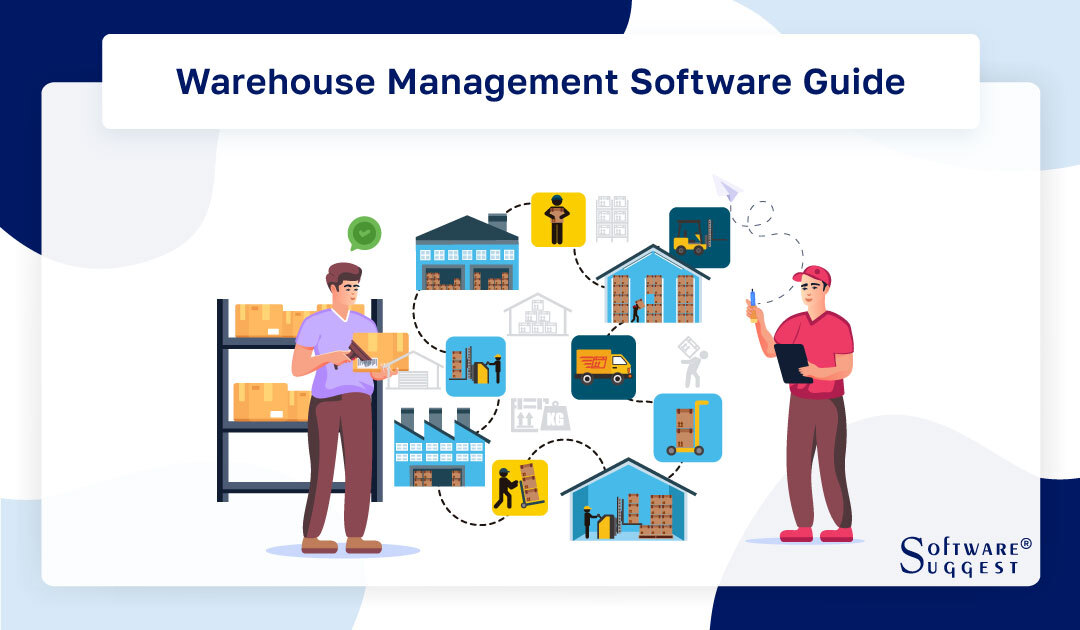
Every business today, be it an online or an offline business, requires an inventory. The inventory is a storage house for loads of material and goods that must be managed and monitored daily. Such large inventory can’t be managed manually and hence involves software. The warehouse management software works and tracks the list and contains the entire distribution channel. Proper Warehouse software manages and boosts the business revenue by taking care of the optimum utilization of the resources, vendors, investors, and internal team. Operations in a warehouse include inventory management, picking process, and auditing. Did you know? The warehouse management software (WMS) market was valued at USD 2.4 billion in 2020 and is likely to reach USD 5.1 billion by 2025.
What is Warehouse Management Software?
Warehouse management software is an automated platform for managing warehouse operations. It helps to keep track of inventory, organizes where items are stored, and makes sure orders are correctly and on time. It helps to run the WMS smoothly and efficiently.
Why Need Warehouse Management Software?
The warehouse is the backbone of any business. E-commerce retailers rely heavily on warehouse goods. Hence the need to properly manage the warehouse components is a necessity. Warehouse management software takes care of the stock record.
It involves details about the available material and goods in stock, stock location, stock level, real-time inventory management, automated purchase management, routing and tracking shipments, and multiple order management. It cuts down the manual labor task of recording and maintaining the files for individual stocks. Keeping paper files is always a tremendous task with a big stockpile in the storehouse.
However, before switching to automated software, companies tried to switch over to Excel and spreadsheets. But again, with the bulk of material stored in the warehouse, the accuracy and spontaneity in recording the data and the facts were hardly achieved. Moreover, the challenge was to update the data manually every time and keep track of the shipments. Hence, the warehouse management tool came into the role. The software eliminates the need for manual management and does not involve a team to update and track the stock. Once entered and updated, the software takes care of all the details associated and keeps the details in the record to be accessed anytime.
What are the Types of Warehouse Management Software?
Warehouse management solution (WMS) serves as a boon as it facilitates e-commerce businesses to manage their daily operations. Without a WMS, companies may risk falling behind on inventory control, picking, and shipping their orders, which translates into lost time and money. The most popular types of WMS software often utilized by third-party logistics businesses include:
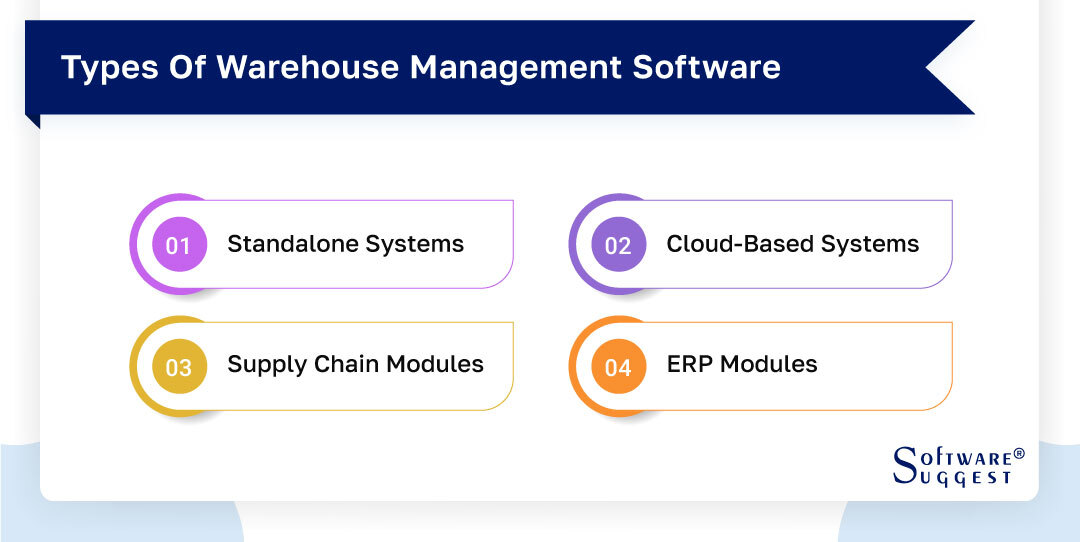
-
Standalone Systems
If you are a business with a low budget, you must consider the standalone system as it only includes the most important feature of SaaS WMS software. It thus caters to all needs of small businesses.
These systems are typical on-premise systems deployed on the business’s native network and hardware. These can be used only for their warehouse management features.
Features:
- Receiving
- Put-away
- Picking
- Shipping
- Bar code scanning
- Tracking of the expiration date
- Cycle count
A standalone warehouse management program lacks many of the tools and features present in an integrated software solution that includes warehouse operations and inventory tracking management. However, these are ideal for small businesses with basic needs.
-
Cloud-Based Systems
This web-based warehouse management solution has various features that help lower operational costs. The software facilitates the speedy implementation of warehouse management strategies. It boasts of higher data security protocols essential for medium to large-scale businesses managing high-value inventory.
Advantages of this cloud-based warehouse management solution:
- Minimized Cost
- Easy to Use
- Quick Implementation
- Scalability
-
Supply Chain Modules
This advanced and feature-oriented warehouse management solution is ideal for businesses of all sizes. The main goal of this system is to automate inventory management, product cycles, sourcing of materials, and other common tasks. Unlike other warehouse management tools, it supports the management of the entire supply chain.
-
ERP Modules
Enterprise Resource Planning (ERP) software is a tool that helps to manage the resources of the whole organization or enterprise. It helps manage all of an enterprise's day-to-day operations, from inventory, tracking, sales, and retail to the supply chain. If you are an organization looking to improve software solutions and improve your ROI, ERP modules are an ideal choice.
What are the Benefits of Using Warehouse Management Software?
Warehouse management software is a major upgrade for any business- small or large. Implementing warehouse management software can reduce cost, enhance visibility, and enable just-in-time inventory. That's why proper warehouse management is important in business. A few of the benefits are:
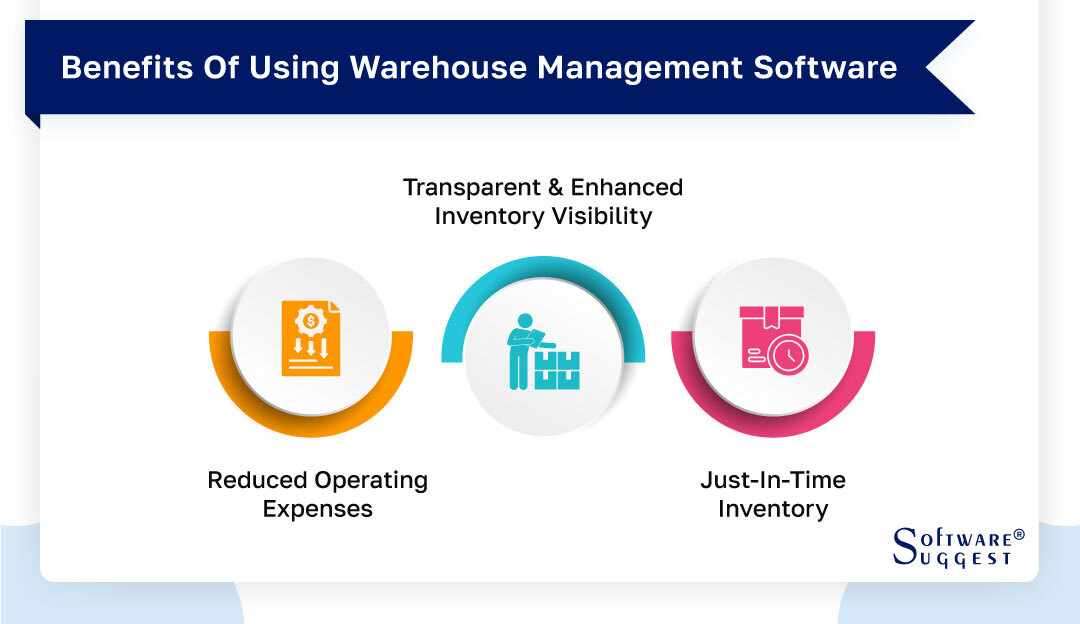
-
Reduced Operating Expenses
If implemented properly, well-designed and better functionality warehouse management software reduces the company's operating expenses. The various warehouse management tools help determine the stockpiles in the warehouse, the expiration dates of products, the floor plans to define storage, and other features needed to maintain the stock well.
-
Transparent and Enhanced Inventory visibility
Features such as a barcode scanner, serial number, and tagging help determine the accurate location of the goods. It helps determine the products in and out of inventory, giving a real-time update on the inventory. Such transparency and visibility are required to create and maintain the demand forecast, which provides greater insight into the products that are more demanded by customers and determines the time of the year when the demand for certain products is high. The traceability factor also ensures recall in case of any damaged goods.
-
Just-in-time inventory
Another feature of the warehouse management software is the just-in-time inventory which refers to the inventory management practice where the stock levels are maintained based on the demand and available goods. Rather than holding the products for long, the Just-in-Time inventory feature ensures that the product needs are fulfilled as and when demand is there. Demand forecasting plays a major role and generates optimal inventory levels to meet the demand without exceeding or underestimating it.
With all the available features and benefits, warehouse management software is mandatory for any business dealing with inventory management. It cuts down the operations time and helps increase the tasks' accuracy.
What are the Key Features of Warehouse Management Software?
The warehouse management software is a multi-management warehouse management software that allows a retailer to maintain the inventory across multiple locations with the help of centralized monitoring and provides tools to enhance order fulfillment.
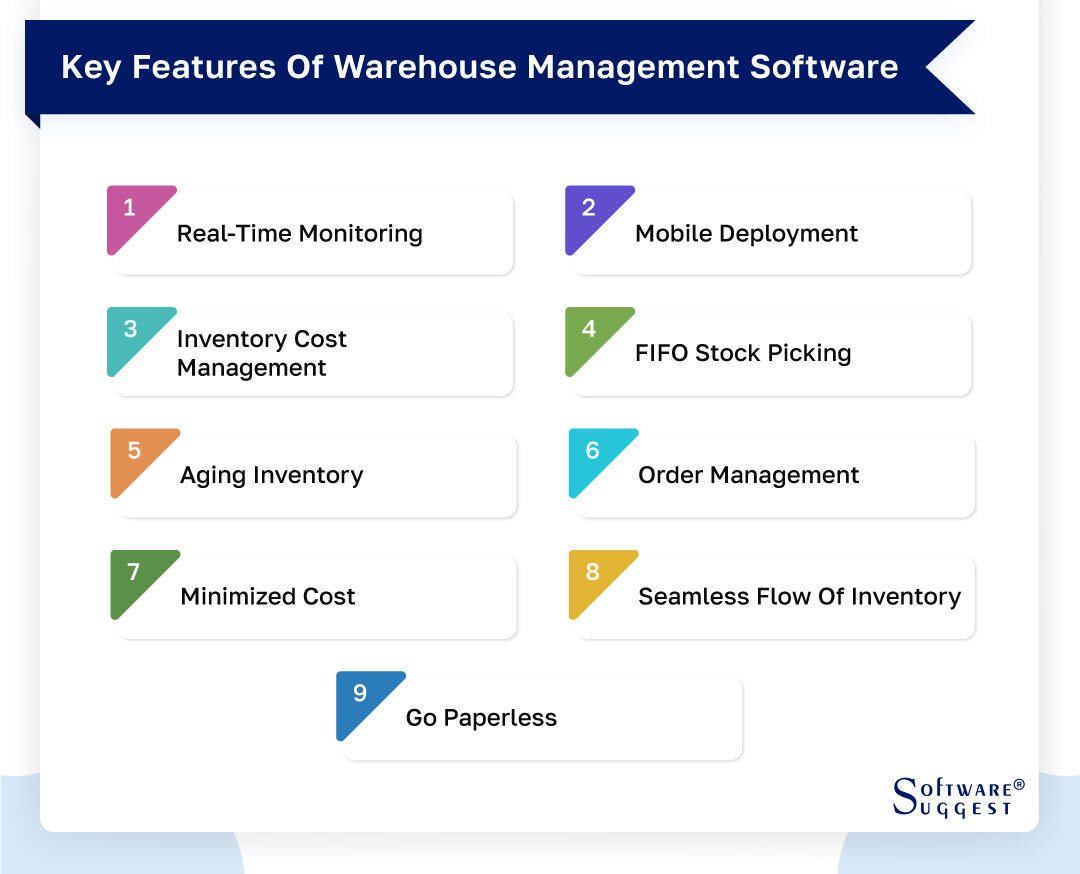
-
Real-Time Monitoring
The admin can keep track of the inventory data in real-time and access details of any goods/material from a remote location. The real-time update provides data on current inventory and inventory value and evaluates and monitors the transactions done throughout the day. It updates the list daily and hence provides the exact data and value.
-
Mobile Deployment
One of the best things about the warehouse management tool is its mobile-friendly interface that can be accessed from smart devices like smartphones, laptops, desktops, etc. It allows the management professionals to set authorities, view purchase orders, raw materials, and finished goods, and track the inventory on the go.
-
Inventory Cost Management
With goods being sold and added to the inventory, the overall cost of the stock tends to fluctuate regularly. A manual system consumes too much time updating daily and still doesn’t assure accuracy. Warehouse inventory management software updates the list and calculates the cost and requirements regularly with much accuracy. Hence, eliminating the need for manual cost tracking.
-
FIFO Stock Picking
The goods and materials in an inventory should be utilized based on the first-in, first-out model. Following this would save the materials from getting spoiled due to the expiration of the date. Such inventory is usually found in businesses dealing with eatable materials. The data warehouse management software takes care of the material to be released according to the first in, first out model, saving the loss that might incur if the material gets stale or spoiled.
-
Aging inventory
An aging inventory is not good for any business. The inventory needs to be tracked and updated regularly. The old products must be dumped, and the new ones to be added as and when required. The warehouse management software updates the admin regularly to keep track of this, so inventory can be managed more effectively.
-
Order Management
The key to any business is to satisfy and make the customer happy. The fast and error-free delivery of the order is most required. The best warehouse management software is dynamic and takes care of the stock pick-up, invoice generation, and order shipment tracking effectively.
-
Minimized Cost
It eliminates inefficiencies and assists employees in managing distribution, procurement, and other associated tasks.
-
Seamless Flow of Inventory
When managing bin operations seamlessly, WMS may help you out! It has a responsive screen feature and intuitive UI that may automatically adjust according to the device's orientation.
-
Go Paperless
As the paperwork is eliminated, it offers features that make the transfer a time-saving task.
Factors To Consider When Implementing a Warehouse Management System
The following are the factors to consider while implementing the right warehouse management system in India:
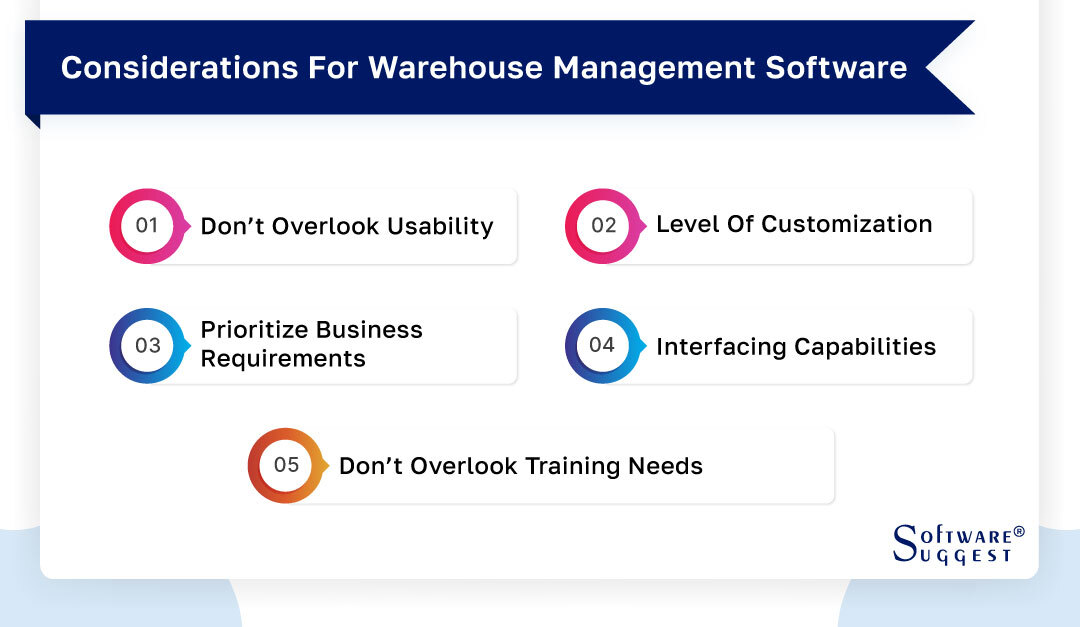
-
Don’t Overlook Usability
Opting for a complex WMS could be potentially daunting. You must consider a user-friendly interface if you don’t want your team to get confused while working with the system.
-
Level of Customization
When choosing the right warehouse management tool, the level of customization plays an important role. There are chances that your business needs may be completely different from other businesses ' needs.
-
Prioritize Business Requirements
Ensure you create a preliminary action plan of WMS and its working in your business environment. You need to identify gaps in your processes and discover how implementing the warehouse management software (WMS) can help bridge these gaps.
-
Interfacing Capabilities
Always remember that the best warehouse management software (WMS) in India should easily interact with the existing equipment and ERP platform. To match the specifications of your new WMS, make sure you replace every other system in your warehouse.
-
Don’t Overlook Training Needs
It is often observed that managers overlook the importance of training their team members on the new system. When you choose and implement a new WMS, you must give prior training to your team to ensure optimum utilization of the warehouse management program.
Best Warehouse Management Software Systems
Let’s discuss the best warehouse management software systems to adopt:
1. NetSuite WM
NetSuite WMS is a cloud-based solution crafted to enhance warehouse operations, offering streamlined functions like receiving, storing, and shipping goods. It optimizes both warehouse and manufacturing processes, boosting efficiency and accuracy throughout the supply chain.
Features
- Mobile RF barcode scanning.
- Task Management
- Returns authorization receipt
- Cycle count plans
- It is simple and so easy to use.
- The company offers a guarantee.
- Wireless warehousing.
- The contact information is visible.
- It has third-party plugins.
- It is not an effective ERP.
-
It is not an effective ERP.
2. Softeon
Softeon software provides a comprehensive platform for efficient warehouse management. With features including inventory tracking, order processing, and labor management, it adapts seamlessly to various warehouse environments, enhancing overall efficiency and scalability. Softeon is a cloud-based solution that provides innovative solutions for the supply chain.
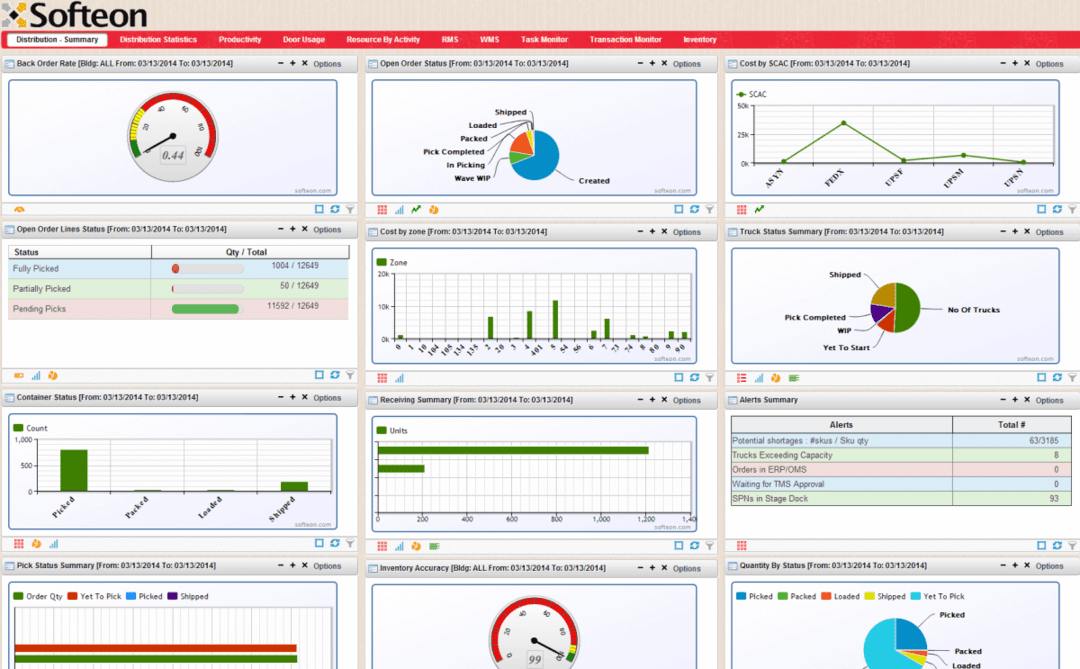
Features
- It is a web-native system.
- Efficient management of orders.
- Productivity tracking
- Scalable architecture
- Task management
- It provides very good customer support.
- It can process high volumes of orders.
- Require ongoing support.
- Reduced cost.
-
Implementation is not as expected.
3. Odoo Warehouse
Provided by Odoo, it is a cloud-based warehouse management tool that has a modern user interface and intelligent workflow capabilities. Odoo warehouse seamlessly integrates with the Odoo ERP platform, offering versatile features such as inventory management, order processing, and barcode scanning. Its high customizability and scalability make it suitable for businesses of all sizes and industries.
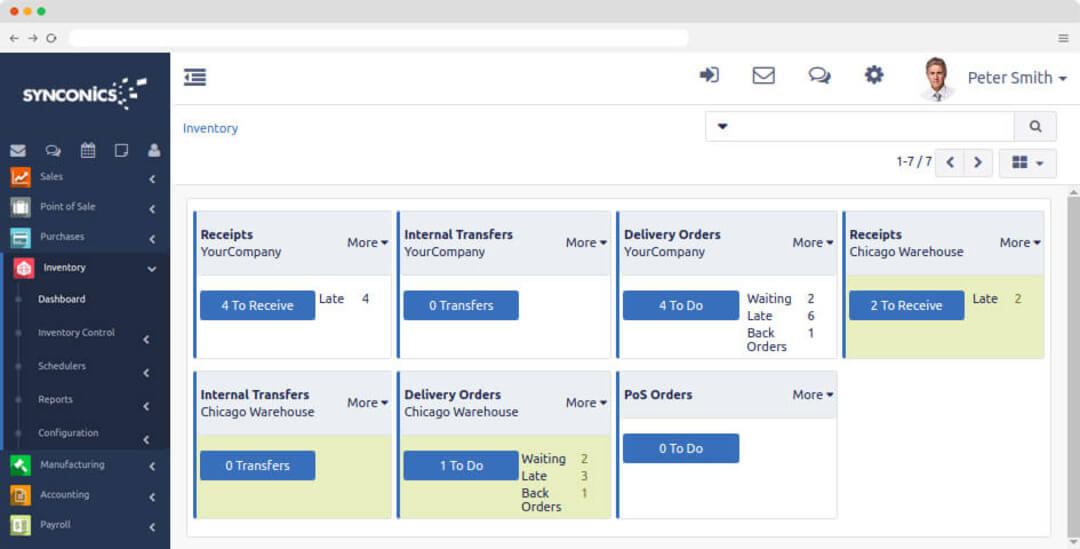
Features
- Seamless integration
- Easy expansion
- Accurate billing
- Mobile barcode scanning
- It is easy to expand the system.
- It is easy to use.
- You can access and handle data from anywhere.
- You might need training to use this system.
4. HighJump
HighJump offers a powerful solution to optimize warehouse operations, providing real-time visibility into activities for informed decision-making. Its scalability and flexibility cater to diverse industry needs, offering future-proof, mobile-enabled solutions tailored to warehouse requirements.
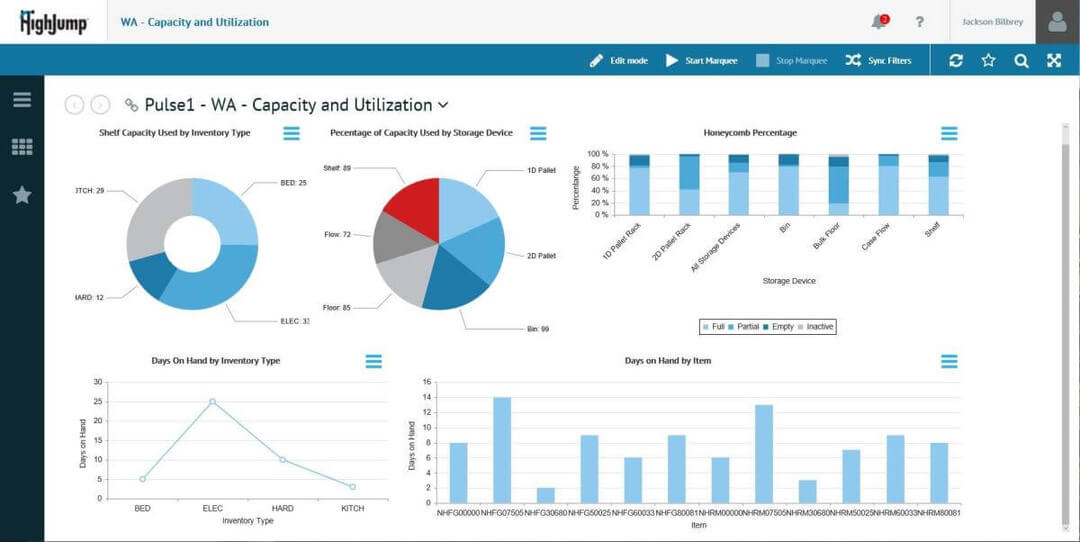
Features
- You might need training to use this system.
- Labor management
- It is a cloud-based system.
- Yard Management
- Supports multi-client operations.
- Omni-channel fulfillment
- The system is robust.
- Products can be enhanced.
-
No card processing capability.
Infor Inventory streamlines inventory management processes with features like tracking, order processing, and real-time visibility. It helps businesses reduce stockouts and enhance order accuracy, making it a top choice for warehouses across various industries and business sizes. Infor is one of the best warehouse management tools for any business size and serves its solutions for all types of industries.
Features
- Continuous innovation
- Seamless automation integration
- Real-time overview
- Omnichannel optimization
- Tailored user interactions.
- Data analysis, notifications, and insights.
- Instant visual representation from the data repository.
- Unified B2B and D2C operations from one location.
-
The User Interface accessed by daily SCM users is outdated and requires an upgrade.
Market Trends In Warehouse Management Software
The latest market trends in the WMS software provide great flexibility in organizing logistics operations. These trends help organizations to optimize the space based on their inventory needs. Some key trends include:
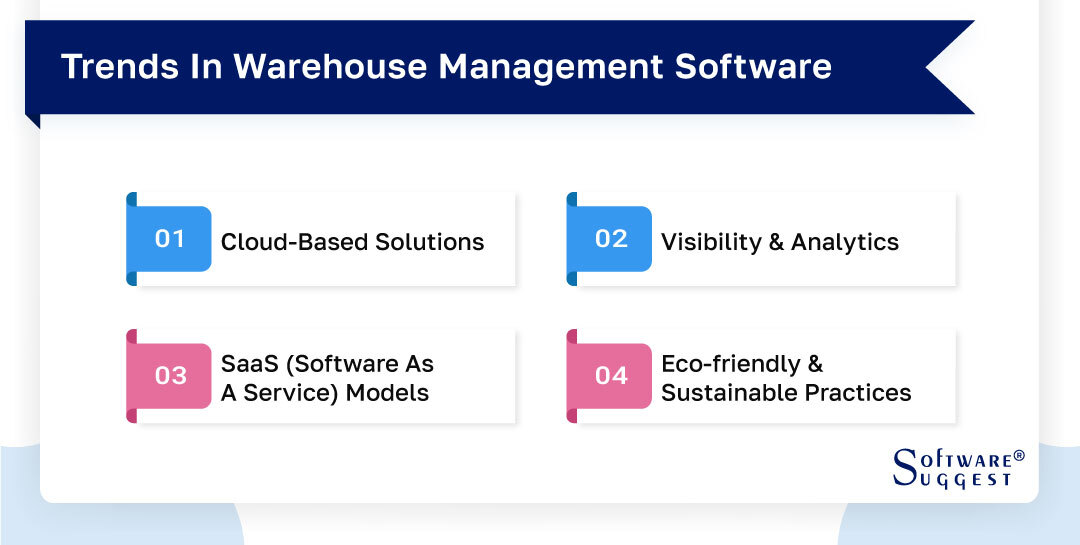
-
Cloud-Based Solutions
With Cloud-based software solutions, users can access the application from any device using an internet connection. Using a cloud-based solution makes it easier to maintain the system and improves its security. It seamlessly helps increase the productivity and also reduces the security risks.
-
Visibility & Analytics
Warehouse management software aims to offer real-time visibility into warehousing activities. It is the ability to monitor, update, or track information and order status, enabling flexibility and improved operational efficiency as it moves through the supply chain.
The supply chain visibility helps to make the data readily available for the stakeholders.
-
SaaS (Software as a Service) Models
The warehouse management software (WMS) market is increasingly favoring Software-as-a-Service (SaaS) models. It offers flexibility, scalability, and cost-effectiveness for businesses of all sizes. With SaaS, companies can access WMS solutions through the cloud, reducing infrastructure costs and streamlining operations.
-
Eco-friendly and Sustainable Practices
WMS trends adapting sustainable methods to reduce the environmental impact of warehouse operations. Using the renewable source of energy helps to reduce the energy cost and the reuse of old products helps to reduce material use, lower costs, and eliminate store inventory.
WMS operation helps to reduce unnecessary paper waste and will reduce the environmental impact of the business.
Conclusion
In summary, warehouse management software streamlines operations enhances efficiency, and boosts profitability by automating processes and providing real-time data insights. It's a crucial tool for businesses aiming to optimize inventory management and remain competitive in today's market.
Related Articles:
- What Is Warehouse Logistics? Challenges, Benefits, and Best Practices
- What Is Warehouse Robotics? A Complete Guide
- Warehouse Automation: Benefits, Challenges, & Best Practices
- Top 12 Warehouse Management Challenges & Its Solutions
- 12 Must-Have Features of Warehouse Management System
- Cloud-Based Warehouse Management System: A Complete Guide
- Digital Warehousing: The Future of Warehousing
- 13 Essential Warehouse Management Best Practices
FAQs
When speaking with businesses seeking inventory management software, the terms Warehouse Management System (WMS) and Enterprise Resource Planning (ERP) software are often used interchangeably. Although ERP software has warehouse management capabilities, they are not the same, and some areas set them apart.
Yes, most modern WMS solutions offer integration capabilities with various business systems such as ERP, CRM (Customer Relationship Management), e-commerce platforms, transportation management systems (TMS), and accounting software. This integration ensures a seamless flow of data across different departments and enhances overall operational efficiency.
The hardware requirements for Warehouse Management Software typically include barcode scanners, mobile devices (such as smartphones or tablets) for scanning and data entry, label printers, and possibly RFID (Radio Frequency Identification) equipment depending on the needs of the operation. Additionally, reliable internet connectivity and computers for administrative tasks are essential.
Yes, most WMS providers offer training programs for users during the implementation phase. Training can be conducted onsite or remotely, and it typically covers system navigation, data entry, scanning procedures, best practices for warehouse operations, and troubleshooting common issues. Ongoing support and training may also be available as part of the software maintenance package.
By Countries























